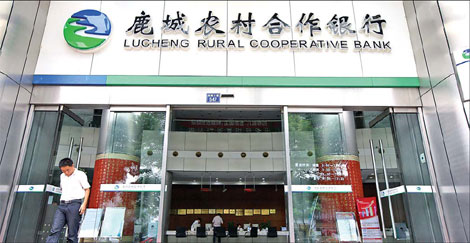Monetary easing may be on cards
Updated: 2011-11-25 07:29
By Wang Xiaotian (China Daily)
|
|||||||||
|
A customer leaves the Lucheng Rural Cooperative Bank in Yiwu, Zhejiang province. Analysts expect China to loosen its monetary policy and say the nation's macroeconomic stance might change during the annual Central Economic Work Conference. Zhou Junxiang / For China Daily |
Cut in reserve ratio viewed as indicative of a possible change in nation's policy
BEIJING - Monetary-loosening measures by the Chinese government are imminent, and the tone of its macro policy may change during the nation's annual Central Economic Work Conference, which is scheduled to begin in December, according to analysts.
Six rural credit cooperatives in Zhejiang province will see a 50 basis point reduction in the reserve-requirement ratio (RRR) to 16 percent, effective from Friday, the Xinhua News Agency reported on Wednesday, citing Hangzhou branch of the People's Bank of China (PBOC), the central bank.
The move is being viewed by some observers as a signal of lowering the RRR for some other lenders, and indicates limited loosening of monetary policy.
However, the Hangzhou branch of the PBOC said the reduction is merely a restoration of the RRR to a normal level among these banks, and should not be understood as a general cut.
A year ago, the PBOC implemented a 50 basis point increase in the RRR for 20 rural cooperative banks nationwide, including six in Zhejiang, because they didn't make enough agriculture-related loans.
"There is the possibility of a cut in the RRR in the first quarter (of 2012), and the tone of macro policy will change during the Central Economic Work Conference," said Huang Jifa, deputy head of investment banking at Industrial and Commercial Bank of China Ltd, as quoted by Reuters on Thursday.
Calls for a loosening of the monetary stance grew after the preliminary HSBC Purchasing Managers' Index (PMI), a main gauge of manufacturing activity, dropped to 48 in November from 51.1 in October, the lowest level since March 2009.
On Thursday, Huang Libin, an official from the Ministry of Industry and Information Technology, said that growth of China's industrial output in 2012 may be 1 to 2 percentage points lower than this year.
Huang said China's annual GDP growth is expected to reach 9.2 percent this year and will continue to experience a moderate cooling in 2012.
The weak preliminary PMI figure reinforced the view that the risk of GDP growth falling to 8 percent in the first quarter of next year has increased, said Zhang Zhiwei, Nomura Holdings Inc's chief economist for China.
"We reiterate our view that the housing sector has reached a tipping point and should deteriorate quickly in the coming months, dragging down related sectors, particularly steel and power," Zhang said.
Meanwhile, Chang Jian, a China economist with Barclays Bank PLC, said she sees downside risks to the previous below-consensus forecast of GDP growth of 8.4 percent for 2012. That's mainly as a result of a deterioration in the growth outlook for the euro-area and an ongoing and widespread correction in the Chinese property market.
However, fiscal policy will play a bigger role in supporting growth, while monetary policy will likely maintain a neutral stance for the time being, said Chang.
"We expect more 'fine-tuning' measures by the central bank in the coming months, including those targeted at small companies and exporters."
Chang added that the possibility of a selective lowering of the RRR for some banks, or even a broader cut in the RRR before the end of this year, cannot be ruled out, because the growth of M2 - a broad measure of money supply - and total social financing are slowing quickly.
"Even if a broader RRR cut were implemented, we think it would be used to stabilize liquidity conditions - for example, to offset a contraction due to capital outflows."
But Wang Tao, head of China economic research at UBS Securities Co Ltd, said the lower interest rates in the interbank market in October indicated that overall liquidity is not actually all that tight, and that the traditional year-end increase in expenditure of the nation's fiscal deposit will inject more liquidity into the system.
"We indeed predicted that China will loosen its monetary policies, but the government will not make the change high profile," said Wang.
China Daily
(China Daily 11/25/2011 page13)











